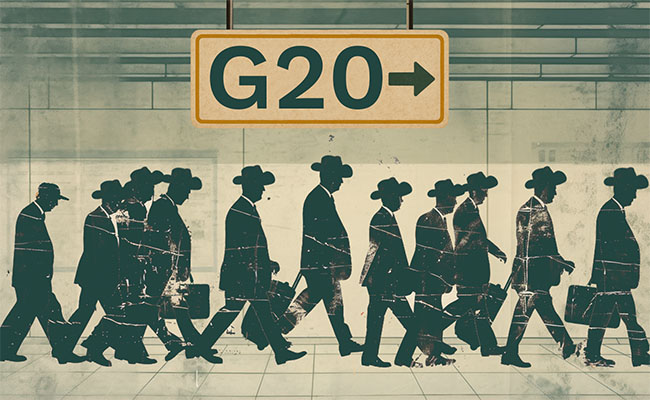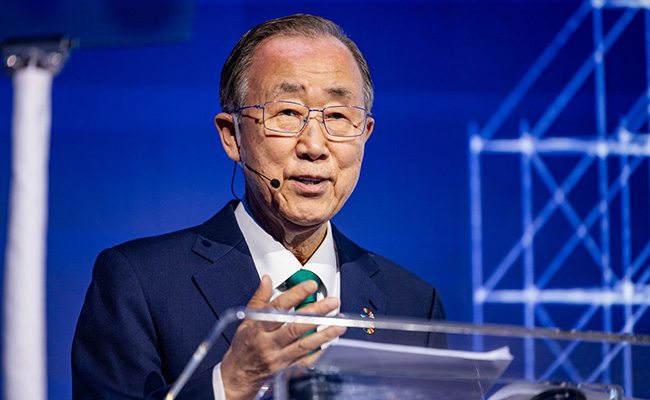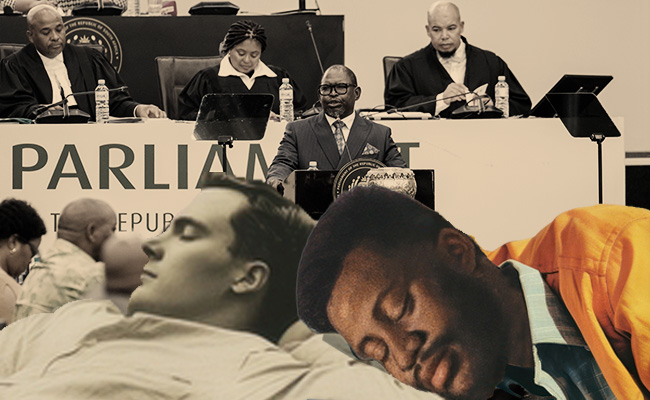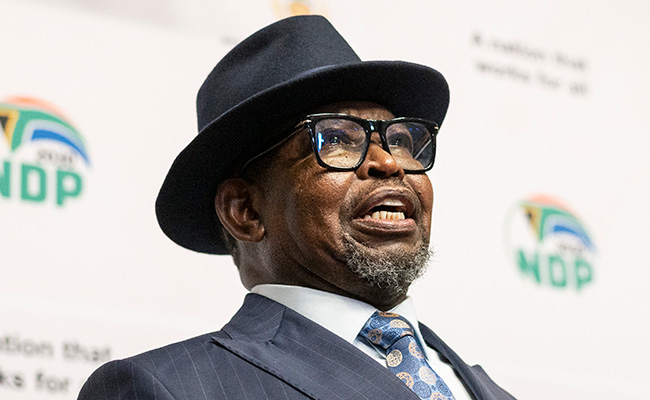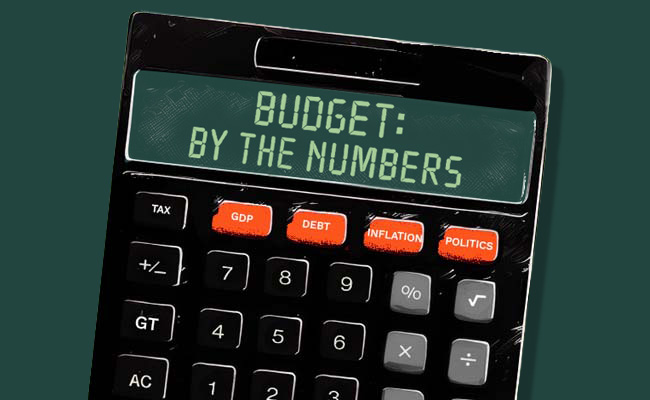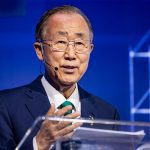Turns out, the Americans did arrive in their droves to participate in the G20 2025 summit in Joburg – despite Donald Trump ordering a boycott of the global event.
The US had the largest delegation of business chiefs, after South Africa, at one of eight work streams ahead of this weekend’s gathering of world leaders. That event will be minus US President Donald Trump and his Argentinian counterpart Javier Milei, who won’t show up in solidarity with the head of the world’s biggest economy.
China’s President Xi Jinping had scheduling conflicts, so he’s sending his premier in his place. Russia’s Vladimir Putin is also skipping the summit, sending a senior official to represent him.
The summit is expected to attract 3,000 executives through the B20, the private-sector engagement group of the G20, whose recommendations on issues such as trade and investment feed into the policies adopted by political leaders. The finance and infrastructure stream alone attracted about 150 representatives, with South Africa, the US and Zimbabwe leading the numbers.
Fears that whatever resolutions are taken at this summit will be undone when the US takes over the rotating chair next year are overblown, co-chairs of the panel overseeing the finance and infrastructure task force told journalists this week. While not at the briefing, JPMorgan Chase president and chief operations officer Daniel Pinto was one of the 10 co-chairs of the work stream, which has put opportunities in frontier and emerging markets, like those in Africa, at the centre of its recommendations.
“The point of the B20 and the G20 is not to lead to immediate policy or regulatory change … but to create opportunities for global conversations and move the world much closer towards consensus,” said Sim Tshabalala, CEO of Standard Bank and the chair of the B20 finance and infrastructure task force.
International Chamber of Commerce (ICC) secretary-general John Denton said business decisions taken at the G20 will outlast political agendas. “The first point is: don’t confuse a cycle with a trend,” he said. “There’s an enormous trend towards making Africa investable … The cycle is political – but the trend will continue.”
Businesses, it seems, aren’t paying attention to the cage-rattling by Trump, who has attacked what he perceives as a “white genocide” in South Africa, the country’s recently adopted land-expropriation laws, its attachment to BEE and calls by EFF leader Julius Malema to “Kill the Boer.”
Trump is also lashing back at South Africa’s theme for the gathering of “Solidarity, Equality and Sustainability”, with his administration criticising the size of the summit and its focus on diversity and climate. Relations have also been strained by South Africa’s decision to haul US ally Israel before the International Court of Justice over the war in Gaza.
Opportunity, not politics
So, why turn up anyway? Because opportunity trumps politics. As Organisation for Economic Co-operation and Development finance committee chair Gianluca Riccio noted: “Investment follows opportunity – not sentiment. Africa’s young population is a massive opportunity. Shape the opportunity properly, and the investment will follow.”
With a population of 1.4-billion in 2024, Africans aged 20-64 are expected to increase from 883-million to 1.6-billion by 2050, accounting for nearly 25% of the global working-age population, according to the UN. Economic growth in Sub-Saharan Africa is expected to outpace the global average in 2025 and 2026 – at 4.1% and 4.4% respectively – narrowly ahead of other emerging and developing markets. According to the International Monetary Fund, advanced economies will expand by only 1.6% this year and next.
It’s not only opportunity that businesses are chasing; it’s the other self-interest of protecting themselves from an uprising by the poor and marginalised. The continent has one of the largest informal economies, with as much as 90% in some countries, and solving inequality means finding ways to “ensure that everybody is carried along”, said Samaila Zubairu, the CEO of the Africa Finance Corporation (AFC).
Africa must move “from exporting raw materials to transforming them”, which requires energy, connectivity and large-scale infrastructure, he added. The continent needs $130bn-$170bn in annual spending, but falls short by as much as $108bn of what lenders are making available, according to the African Development Bank.
“If you don’t get infrastructure to people, you can exacerbate social unrest and inequality,” the ICC’s Denton said. Yet the financial system punishes developing nations by failing to understand them properly.
“Without making some leeway, still respecting risk and making the right calls,” he said, “there’s a risk that you can actually create more instability.”
Despite common perceptions, Africa’s infrastructure projects have lower default rates – and higher recovery rates – than most emerging markets, outperforming Latin America, Eastern Europe and some Asian markets, according to the AFC’s Zubairu.
‘Trillions of dollars’ on the sidelines
One source of capital that hasn’t yet been fully explored is philanthropy, said British Robinson, Africa chair for the Milken Institute International.
“There are trillions of dollars sitting on the sidelines in low-yield products, when they can actually have better returns,” she said, “but also people talk about social impact – do well and do good.”
Blended finance – where public or philanthropic capital takes on early risk to unlock private investment – has become essential to making African infrastructure projects “bankable”, slashing the cost of capital, Robinson said. The Milken Institute is working with Worldwide Initiatives for Grantmaker Support to drive the process, having spoken with as many as 75 organisations and foundations this week.
“They are ready to execute,” she said.
To close, she added: “As an American, I love my country, and I love this continent… You’re also handing off to the American people, who love this continent and believe in its future. So don’t mistake it for one situation – it is truly a trend. And we are proud to partner with you.”
And while the G20 wraps up this week, the work does not. The task forces’ recommendations feed into future presidencies, and several are aimed directly at governments – from how they structure proposals to how they de-risk projects.
“The world is perhaps more divided than it needs to be,” said Benjamin Hung, president, international, at Standard Chartered. “If you think about sustainability, if you think about other poorer countries, if you think about the infrastructure gaps, trade, finance … businesses do have a big role to play.”
ALSO READ: Why Africa pays more for its debt – and how to fix it
Top image: Rawpixel/Currency collage.
Sign up to Currency’s weekly newsletters to receive your own bulletin of weekday news and weekend treats. Register here.


